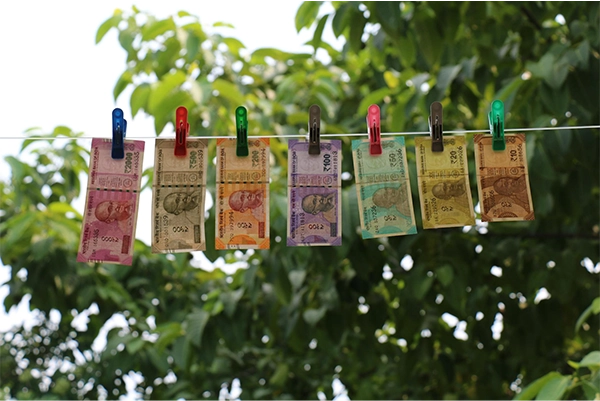1. Introduction
Adjudication is the process through which the Adjudicating Authority adjudicates upon a complaint received by them through the Director or any other agent authorised by him/ her in that behalf. The complaint is filed regarding any property that is alleged to be involved in an offence of money laundering. Such property that is believed to be a proceed of crime or is being used to wash proceeds of crime is provisionally attached by the investigating agency i.e. the Enforcement Directorate and thereafter the provisional attachment order in the form of a complaint along with the material relied upon is sent to the Adjudicating Authority to adjudicate and confirm the provisional attachment of such property for a period during which the investigation before the. agency/ trial before the Special Court remains pending. The adjudicating authority comprises of a Chairperson and two other members. The Chairperson may constitute a bench with either one member or two members as he may deem fit. The composition of the Adjudicating Authority and process of Adjudication is envisaged in Section 6 and Section 8 of the Prevention of Money Laundering Act, 2002 (PMLA) ‘hereinafter referred to as the Act’. The provisional attachment of such property is done under Sub-section 1 of Section 5, Section 17 or Section 18 of the Act.
2. Issuing Process
Before issuing process there are two pointers that are necessary for the Adjudicating Authority ‘hereinafter referred to as the Authority’ to consider before it starts with the process of Adjudication. Firstly, the authority has to receive a complaint under any of the following sections i.e. Sub- section 5 of Section 5, Sub- section 4 of Section 17 or Sub section 10 of Section 18 of the Act and secondly, the Authority after reading the complaint must have reason to believe that an offence under section 3 of the Act has been committed or proceeds of crime are held by the accused. Once the Authority satisfies itself regarding the above mentioned pointers it then proceeds to issue a notice of not less than 30 days to the accused to show the sources of his/ her income/ earning or assets through which the attached property has been acquired.
The notice, calls upon the accused to adduce evidence in his support and show cause as to why the provisional order of attachment not be confirmed. If in case the property in question is being held by a person on behalf of any other person, then copy of notice has to be served on that person as well and if such property is held jointly by more than one person then notice has to be served on all such persons.
3. Consideration of Reply and Order
Once the accused person/ persons file a reply or chose not to file a reply the Authority is bound to hear both the sides i.e. the prosecuting agency and the accused in person if he/ she is not being represented by a legal counsel and consider the material on record submitted by both sides in support of their claims. After hearing and examining all the material on record the Authority either confirms the provisional attachment order or dismisses it. It is interesting that even though the Authority does not adjudicate upon the merits of the case, it is yet supposed to confirm the provisional attachment order after forming an opinion as to whether the property in question is involved in money laundering or not. This order confirming the order of provisional attachment is an order that is passed for a period during which the investigation/ trial continues. So, even though it is a final order that survives during the entire period during which the investigation/ trial continues, in essence the Authority is empowered to pass only ad interim orders confirming provisional attachment orders or dismissing the same.
In a case where the property is claimed by any other person, other than the person to whom notice has been served, then such person is also supposed to be heard before passing an order.
4. Confirmation/ Dismissal of Complaint
Once the Authority forms an opinion that the property in question is a proceed of crime or is in anyway involved in the offence of money laundering then confirmation of the provisional order of attachment follows. Such attachment/ retention or freezing continues during investigation for a period not exceeding three hundred and sixty-five days or during the pendency of proceedings before a Special Court. If in case the proceedings are pending in some other country then such property remains attached in accordance with the corresponding laws of that country.
The confirmation of a provisional order of attachment becomes final only once an order of confiscation is passed under any of the following sections i.e. under sub-section (5) or sub- section (7) of section 8, section 58B or sub-section (2A) of section 60 of the Act by the Special Court. Any final order order of attachment is passed only by the Special Court after it has adjudicated upon the merits of the case and returned a positive finding.
5. Taking Possession and Confiscation/ Release
On confirmation of the provisional order of attachment the Director or any other person who is authorised by him/ her takes possession of the property in question and if taking possession of such property is not practical then the order confirming the provisional attachment/ confiscation order has the same effect as if the possession of property had been taken.
Once the trial has concluded and the Special Court affirms the committal of an offence of money laundering, whether by means of the property being involved in money laundering or being used for commission of the offence of money laundering, the attached property stands confiscated to the Central Government. However, if no such offence if found to be committed then the property is released by the same court to the person entitled to receive it.
If the accused dies or is declared a proclaimed offender or for any other reason the trial cannot be concluded then the Special Court passes appropriate orders regarding confiscation or release of the property after examining the material before it.
6. Oblivious Person
If in case a person claims to be oblivious of the fact that the property was involved in money laundering and the special court on that persons request after examining the material on record also positively affirms such a situation then the Special Court can direct the Central Government to restore such confiscated property or part thereof of a claimant with a legitimate interest in the property who may have suffered a quantifiable loss as a result of money laundering. However, the Special Court needs to be satisfied that the claimant acted in good faith and suffered the loss despite taking all reasonable precautions. The Special Court may also pass such orders during the trial to restore such property of a claimant before passing the final order.
7. Authors Comments
Just Like all other statutory/ constitutional courts/ tribunals and judicial and quasi judicial bodies even the Adjudicating Authority is bound by the principles of natural justice. However, the irony is that even though it is vested with the powers of a civil court, is bound by the principles of natural justice and is supposed to form an opinion upon the merits of the case it is not a judicial or quasi judicial body (Writ Petition Nos. 12925/ 12709/ 12710 of 2023 titled as Pay Perform Indian Private Limited v/s Union of India and another decided on 31.01.2024). The Authority only passes ad interim orders confirming the provisional attachment orders and final orders of confiscation are passed only by the Special Court after it has adjudicated upon the merits of the case and returned a positive finding. There are broadly three stages of this process and it starts with the officer concerned by passing a provisional attachment order which is either confirmed or dismissed by the Authority. The ad interim order if passed remains in operation during the subsequent period of investigation/ the period during which the trial continues and thereafter the final order of confiscation is passed only once the Special Court finds the accused guilty of the charged offence. Within these stages are sub stages and it is the sub stages of the process of adjudication before the Authority which we have discussed in this blog. The law makers have been conscious of the fact that at times a person can be oblivious of the fact that certain property is a proceed of crime and thus to safeguard the interest of such innocent citizens have incorporated appropriate provisions. However, for the not so oblivious ones such property is confiscated and given to the Central Government. Come to think of it, this is a central legislation, the investigating agency comes under the Centre, the Authority is appointed by the Central Government and once the property is confiscated it even vests with the Centre- just a thought to ponder upon. Whether or not the district judiciary be brought under Central purview remains a hotly debated topic.





